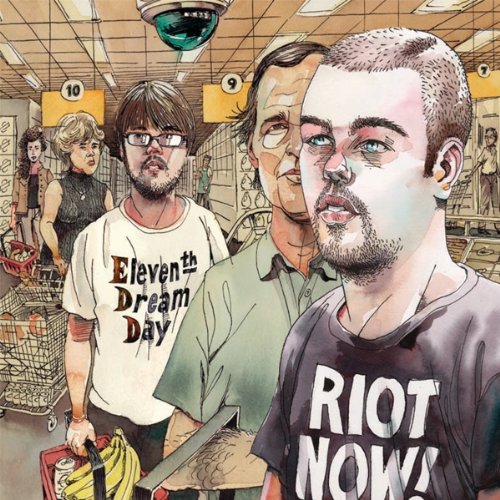
Eleventh Dream Day
Riot Now!
Release Date: Mar 15, 2011
Genre(s): Pop/Rock, Alternative/Indie Rock, Alternative Pop/Rock
Record label: Thrill Jockey
Music Critic Score
How the Music Critic Score works
Buy Riot Now! from Amazon
Album Review: Riot Now! by Eleventh Dream Day
Fairly Good, Based on 5 Critics
Based on rating 8/10
It's no real surprise that after nearly 30 years as a band and five years since their last album, Eleventh Dream Day reconvened to record again. They've practically made a career of being underappreciated but something continues to bring them back to make music together despite a myriad of divergent paths over the years. What is a bit of a surprise is that this is probably their hardest-rocking album since Prairie School Freakout, their debut full-length from 1988.
Based on rating 7/10
The idea of ‘cult’ bands is aggravatingly vague to start with, and probably more overused than ‘genius’ in the chatter of music nerds. Even bearing this in mind, it seems wrong to describe Eleventh Dream Day this way, even though they have many of its hallmarks. Cultness, in a rock context, tends to imply an act whom not that many folks have actually heard, but who inspire passion among this small minority.
Based on rating 6/10
These Chicago-based indie-rock stalwarts return with a welcome jolt. I’ve admired them since their 1988 full-length debut, Prairie School Freakout. That was recorded, its liner notes explained, in an all-night session, half of which was spent trying to fix the amplifier’s buzz, the other half giving in and getting on with rowdy, rootsy tunes mingling harmonies with feedback, Rick Rizzo’s guitar aggression with Janet Beveridge Bean’s backing vocals, and smart drumming.
Based on rating 3/5
It wouldn’t be accurate to call Eleventh Dream Day also-rans, mainly because for nearly 25 years they’ve managed to release an album every five or six. Still, they’ve never received the attention and accolades many of their Chicago peers have, and the words “overlooked” and “underappreciated” pop up frequently in reviews and press bios. EDD is probably known to some people as the ‘other’ band of drummer Janet Bean, who showcases her voice and songwriting more prominently in country-folk group Freakwater, and bassist Doug McCombs, who helped define what we call post-rock in the not-exactly-starved-for-attention band Tortoise.
Based on rating 5.9/10
In February 2004, Pixies reunited. People lost their marbles. Tickets for an official run of reunion shows sold out at a record-setting pace, some dates in less than just three minutes. Their comeback became the first of many during the 00s, defunct or dormant indie rock luminaries like Dinosaur Jr., Superchunk, Slint, and even Pavement returning to stages and levels of attention they had never seen in their relative, pre-Internet heyday.
'Riot Now!'
is available now

